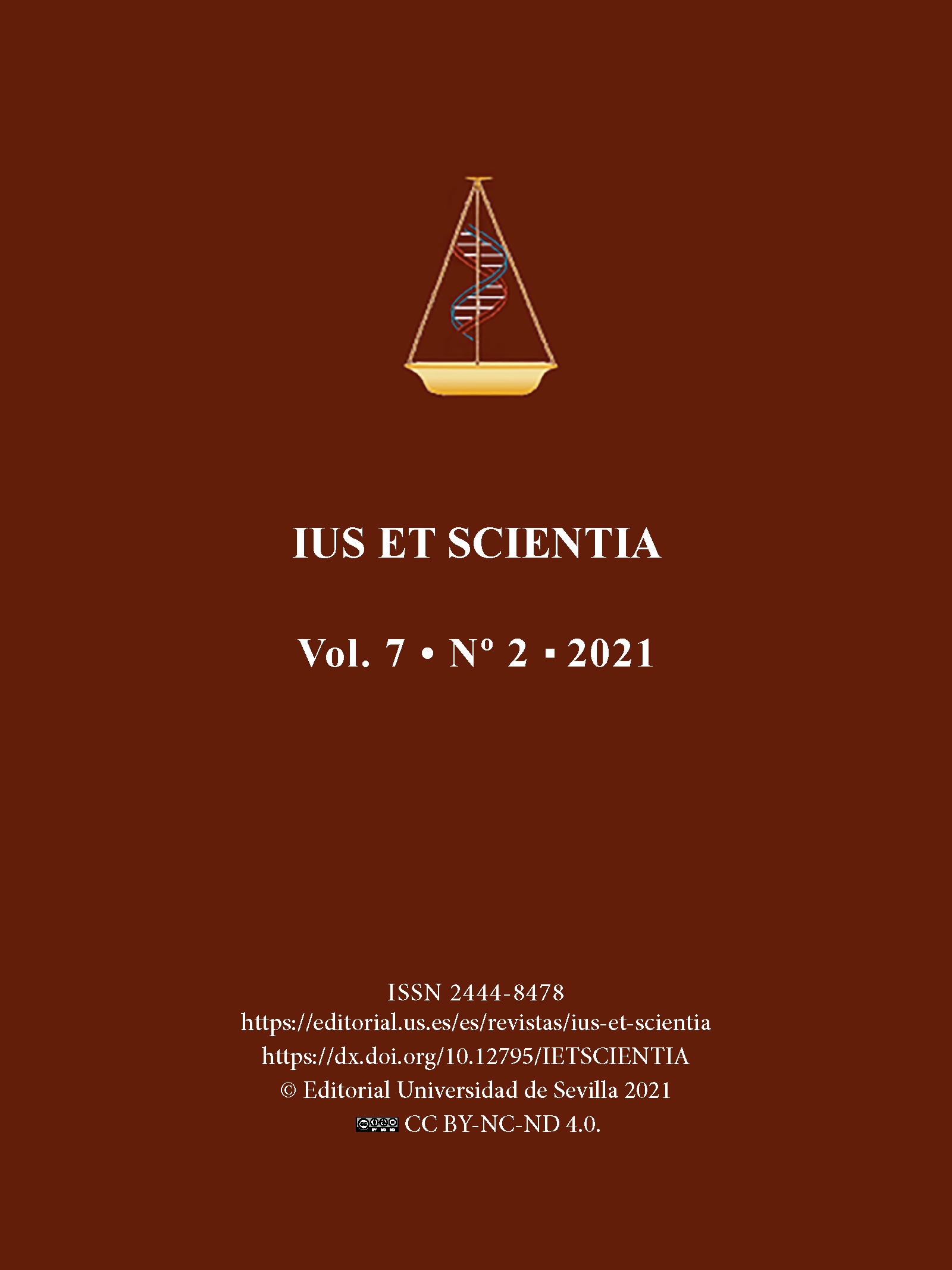Strategies of the civil procedural iter in a family law case: artificial and human management
DOI:
https://doi.org/10.12795/IETSCIENTIA.2021.i01.07Keywords:
Artificial intelligence, Cognitive process, Family process, Helping tools, Human lawyer, Procedural approachAbstract
This study presents a comparison on the procedural treatment that a Family Law matter can receive, from the point of view of the legal professional, as a human professional or as artificial intelligence. The specific assumption has been extracted from the actual forensic practice of a law firm. The approach focuses on the resolution of the conduct of the civil process from its inception to its completion in the judicial process. The factual assumption addresses the problem of deciding the measures to be agreed upon in particularly conflictive parent-child relationships and with various problematic factors. The analysis tries to confront the answers given by the jurist, from a subjective framework inherent to his quality of person, against that of an artificial intelligence, from his purely objective context. The Civil Code and the Civil Procedure Law constitute the legal regulation that serves as the basis for the different interpretations.
Downloads
References
Legislación;
Real Decreto de 24 de julio de 1889 por el que se publica el Código Civil. Gaceta de Madrid, núm. 206, de 25 de julio de 1889, BOE-A-1889-4763. https://www.boe.es/eli/es/rd/1889/07/24/(1)/con, en su última actualización publicada el 04/08/2018.
Ley 1/2000, de 7 de enero, de Enjuiciamiento Civil. Boletín Oficial del Estado, núm. 7, de 08 de enero de 2000, BOE-A-2000-323. https://www.boe.es/eli/es/l/2000/01/07/1/con,en su última actualización publicada el 12/11/2020.
Referencias bibliográficas y otras fuentes consultadas;
Atienza, M. (2013). Curso de argumentación jurídica. Editorial Trotta, 180-185.
CCBE Considerations on the Legal Aspects of Artificial Intelligence (2020). Recuperado el 14 mayo 2021, de https://www.ccbe.eu/fileadmin/speciality_distribution/public/documents/IT_LAW/ITL_Guides_recommendations/EN_ITL_20200220_CCBE-considerations-on-the-Legal-Aspects-of-AI.pdf
Council of Bars and Law Societies of Europe (2021). Recuperado el 15 marzo 2021, de www.ccbe.eu
Cueto Moreno, C. (2016). El quebrantamiento de las órdenes de alejamiento: problemática en el ámbito de la violencia doméstica y de género (1ª edición). Athenaica Ediciones Universitarias.
Esteve de Miguel, S. (2020). La inteligencia artificial al servicio del derecho y su impacto en las profesiones jurídicas. Bigle Legal. Recuperado el 01 abril 2021, de https://blog.biglelegal.com/en/la-inteligencia-artificial-al-servicio-del-derecho-y-su-impacto-en-las-profesiones-jur%C3%ADdicas
Gimeno Sendra, V. (2015). Derecho Procesal Penal (2ª edición).Civitas.
Instituto de Ingeniería del Conocimiento (2020). La Inteligencia Artificial y los despachos de abogados. Recuperado el 01 marzo 2021, de https://www.iic.uam.es/inteligencia/la-inteligencia-artificial-y-los-despachos-de-abogados/
López de Ochoa, A. (2020). ¿Puede la inteligencia artificial sustituir a los abogados en el futuro?. Diario Jurídico. Recuperado el 10 febrero 2021, de https://www.diariojuridico.com/puede-la-inteligencia-artificial-sustituir-a-los-abogados-en-el-futuro/
López Oneto, M. (2020). Fundamentos para un Derecho de la Inteligencia Artificial ¿Queremos seguir siendo humanos? (1ª edición). Tirant lo Blanch, 173-177.
Martín Ostos, J. (2020). Manual de derecho procesal penal (4ª edición). Astigi.145-149.
Martín Ostos, J. y Pérez Marín, M.A. (2020). Lecciones de derecho procesal civil. Astigi.563-566.
Martín Ríos, P. (2012). Víctima y justicia penal: reparación, intervención y protección de la víctima en el proceso penal. Atelier.
Martínez Bahena, G. C. (2012). La inteligencia artificial y su aplicación al campo del Derecho. Revista Alegatos, 82, 827-846. http://alegatos.azc.uam.mx/index.php/ra/issue/view/19
Moreno Catena, V. y Cortés Domínguez, V. (2019). Derecho procesal penal (9ª edición). Tirant lo Blanch, 157-169.
Ortells Ramos, M., y Bonet Navarro, J. (2020). Derecho procesal civil (19ª edición). Aranzadi-Thomson Reuters. 816-817.
Parlamento Europeo (2021). Textos aprobados/ 16 de febrero de 2017, P8_TA(2017)0051. Normas de Derecho civil sobre robótica. Recuperado el 1 de abril de 2021, de https://www.europarl.europa.eu/doceo/document/TA-8-2017-0051_ES.html
Published
How to Cite
Issue
Section
License
Those authors being published in this journal agree to the following terms:
- Authors retain their copyright and they will guarantee to the journal the right of first publication of their work, which will be simultaneously subject to license recognition by Creative Commons that allows others to share such work provided it is stated the author’s name and his first publishing in IUS ET SCIENTIA.
- Authors may take other non-exclusive distribution license agreements version of the published work (e.g. deposit in an institutional digital file or publish it in a monographic volume) provided it is stated the initial publication in this journal.
- It is allowed and encouraged that Author s disseminate their work via the Internet (e. g. institutional digital files or on their website) prior to and during the submission process, which can lead to interesting exchanges and to increase citation of the published work.
- Abstract 1902
- pdf (Español (España)) 352
- html (Español (España)) 494





